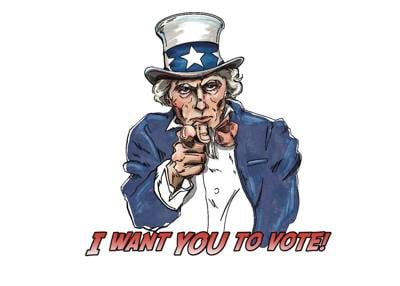For many NC State students, this year’s presidential election will be the first they are eligible to vote in. As the 2024 presidential election approaches and political anxiety swells, veteran voters are turning their attention to the new kids on the block — Gen Z.
With President Joe Biden suspending his re-election campaign, the subsequent launch of Vice President Kamala Harris’ campaign and the assassination attempt on former President Donald Trump, the 2024 election has begun with a series of unprecedented events that now find Harris and Trump at a practical standstill, according to most polls.
Historically, students and young people as a whole are less likely to vote than other age groups. Steven Greene, a professor in the political science department, said this demographic tends to think their voice doesn’t matter.
“Young adults are always less inclined to vote,” Greene said. “People who choose not to vote feel that nothing really changes. They have what we call ‘low political advocacy.’ They think their voice doesn't matter. People who don't vote tend to have low institutional trust. They just don't believe anything really works for anybody, and feel disengaged and shut out of the political system. They're wrong, because it does matter.”
Lucas Reed, a third-year studying engineering, said although he doesn’t plan on voting this year, there are issues on the ballot that are important to him.
“I'm not super informed on everything, but I think the environment, the economy are two big ones for me,” Reed said. “I know those are kind of on opposite sides, but we want something balanced like that.”
Michael Struett, a professor in the political science department, said Gen Z's political socialization during the formative years of 16-21 could define their long-term voting habits.
Struett said the impact of major events during Gen Z's coming of age, such as the COVID-19 pandemic and growing concerns about climate change, may influence their political engagement.
One distinctive characteristic of Gen Z is its use of social media. While this connectivity allows for rapid information sharing and mobilization, Struett said it also raises questions about its effects on political engagement and mental health.
"There is something related to anxiety and the use of social media happening to young people in our culture," Struett said. "That's likely to have impacts on political participation as well, certainly the way people get information and process information about politics."
Kylie Masser, a second-year studying biology, said that social media does influence her personal way of voting.
“Social media makes it possible to coordinate behavior with large groups of people pretty quickly — sort of meme culture, right?” Masser said. “It’s something older generations do not pay attention to as much, because those generations use social media differently.”
With several factors impacting the election, Masser said concerns are high for Gen Z in regards to equal rights opportunities. However, the excitement for first-time voting is still relevant.
Despite the potential for increased engagement, barriers to voting persist for young adults. Struett said frequent relocation and temporary addresses can make it challenging for young voters to stay registered and informed about polling locations.
Struett said different generations have different policy priorities and that low youth turnout would impact legislation on issues such as education funding and reproductive rights as areas where increased youth participation could lead to policy shifts.
"Young people's preferences are different than older people's preferences, and the outcomes of elections would be different if more young people voted," Struett said.



(0) comments
Welcome to the discussion.
Log In
Keep it Clean. Please avoid obscene, vulgar, lewd, racist or sexually-oriented language.
PLEASE TURN OFF YOUR CAPS LOCK.
Don't Threaten. Threats of harming another person will not be tolerated.
Be Truthful. Don't knowingly lie about anyone or anything.
Be Nice. No racism, sexism or any sort of -ism that is degrading to another person.
Be Proactive. Use the 'Report' link on each comment to let us know of abusive posts.
Share with Us. We'd love to hear eyewitness accounts, the history behind an article.